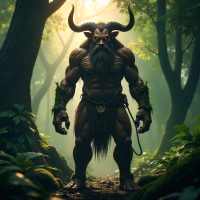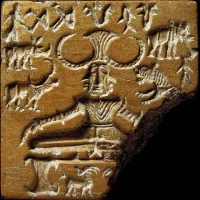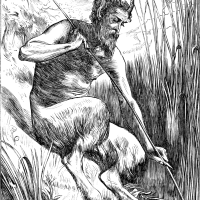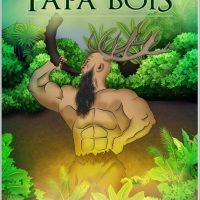Papa Bois : The Wild Guardian Spirit of Caribbean Forests
Listen
At a glance
| Description | |
|---|---|
| Origin | Creole Mythology |
| Classification | Gods |
| Family Members | N/A |
| Region | Trinidad and Tobago |
| Associated With | Forests |
Papa Bois
Introduction
Papa Bois, the legendary “Father of the Forest,” stands at the heart of Caribbean folklore, particularly in Trinidad and Tobago, Grenada, St. Lucia, and Dominica. Rooted in a blend of African spiritual beliefs, French Creole influences, and Indigenous Amerindian ecological wisdom, Papa Bois is revered as the ancient protector of the forest and its creatures. His stories highlight the Caribbean’s deep cultural and environmental consciousness, portraying him as a being who ensures that nature is respected, wildlife is treated with reverence, and humans understand the consequences of exploiting the land. As one of the region’s most enduring mythical figures, Papa Bois bridges the space between the human world and the wilderness, embodying the power, fragility, and spirit of the natural environment that has shaped island life for centuries.
Physical Traits
Papa Bois is traditionally portrayed as a weathered yet powerful forest-being who merges human form with the features of wild animals. Although he often appears as an elderly man, his physique remains muscular and agile, suggesting the strength needed to guard vast stretches of wilderness. His skin is usually described as dark and bark-like, blending seamlessly with trees and shadows. His beard grows long and tangled, threaded with leaves, vines, and moss, reinforcing his identity as a creature born from the forest itself.
One of his most iconic traits is his cloven hoof or deer-like leg—sometimes one, sometimes both—symbolising his connection to the animals he protects. In many tales, he is covered in coarse hair reminiscent of a goat or donkey, and small horns rise from his forehead. His eyes are often described as piercing and alert, capable of noticing even the slightest disturbance in the woods. He carries a bull’s horn at his side, not as a weapon, but as a warning tool to signal animals of approaching danger. These distinct physical qualities ground Papa Bois as a liminal figure—part guardian, part beast, wholly forest.
Family
While Papa Bois is most often depicted as a solitary spirit, Caribbean folklore frequently links him to Mama D’Lo (also known as Mama D’Leau or Mama Glo), the powerful water deity and protector of rivers. Their partnership reflects the natural relationship between land and water in the Caribbean’s fragile ecosystems. Together, they represent a balanced guardianship over two essential realms—Papa Bois oversees the forest’s creatures while Mama D’Lo governs aquatic life and river pathways.
Their union is symbolic rather than domestic, emphasizing ecological harmony rather than human-like family structures. By pairing the spirits of land and water, Creole mythology reinforces the idea that no part of nature exists in isolation; all elements must coexist for the environment to thrive. In this sense, his “children” are the birds, mammals, plants, and forest energies that rely on his presence for protection.
Other names
Across the Caribbean, Papa Bois is known by several names, each shaped by local language and cultural nuance. In French Creole, he is Maître Bois, meaning “Master of the Woods,” highlighting his authority within the natural world. In some regions, he is called Papa Bwa or Daddy Bouchon, terms that refer to his forest origins or describe his hair-covered appearance. These variations show how his myth travelled, adapted, and survived through generations of cultural blending across different islands. Despite the linguistic differences, each name preserves his identity as a fierce yet fair guardian spirit who ensures that the forest remains respected and intact.
Powers and Abilities
The powers of Papa Bois are intimately tied to his purpose as a forest protector. His abilities allow him to monitor, defend, and correct the behaviour of humans who enter natural spaces. Foremost among his abilities is shapeshifting, most commonly into the form of a deer. In this guise, he lures greedy hunters deep into the forest, causing them to become disoriented before revealing his true form. Through this act, he exposes the consequences of hunting for sport or exploitation rather than survival.
He is known for extraordinary speed, able to outrun any animal in the wilderness. His senses are heightened beyond human capability; even the snap of a twig alerts him to disturbances miles away. With the horn he carries, he signals animals to flee whenever a threat approaches—especially hunters who ignore the rules of the forest. In many stories, he communicates directly with animals, instructing them when to hide, migrate, or protect themselves.
Although he can be fearsome, Papa Bois is not malevolent. His punishments—making poachers lose their way, startling hunters, or leading them into thick forest—serve as lessons rather than cruelty. Through his powers, he embodies the Caribbean belief that nature will protect itself when pushed too far.
Modern Day Influence
In the modern Caribbean, Papa Bois remains a vibrant cultural symbol and an enduring guardian figure. His stories are retold in classrooms, community storytelling sessions, theatre productions, and festivals, ensuring that younger generations inherit an understanding of ecological respect. In Trinidad’s Carnival celebrations, he is a popular masquerade character, portrayed with antlers, forest-themed costumes, and the signature bull horn, reminding spectators of their cultural roots.
Environmental groups often invoke Papa Bois as a figure of conservation awareness, using his legend to highlight the importance of biodiversity, reforestation, and wildlife protection. In literature, poetry, and visual art, he serves as a metaphor for the resilience of nature in the face of human-driven change. His myth continues to evolve, now resonating with contemporary issues such as climate change, habitat loss, and sustainable development.
Through stories both old and new, Papa Bois remains a guiding force—a reminder that the Caribbean’s forests are living, fragile, and deserving of respect. His enduring presence in popular culture reflects the wisdom of ancestral teachings and their relevance to modern ecological ethics.
Related Images
Source
Papa Bois – Caribbean Reads. (n.d.). Retrieved from https://www.caribbeanreads.com/papa-bois/
Papa Bois – OBEAH TT. (2018, February 22). Retrieved from https://obeahtt.wordpress.com/2018/02/22/folklore-papa-bois/
Papa Bois: Guardian of the Forest and Protector of Nature. (2024, November 22). Rebel Alkemi. Retrieved from https://rebelalkemi.com/blogs/lore-journal/papa-bois
PAPA BOIS (~ PAPA BOO-WA). (n.d.). Mythologies Of The World. Retrieved from https://mythologiesoftheworld.com/mythologies/papa-bois/
Papa Bois – Caribbean Folklore Month. (2025, September 4). Retrieved from https://caribbeanfolkloremonth.wordpress.com/2025/09/04/papa-bois/
Papa Bois; The Protector of the Forest. (2023, May 12). QUAD TT. Retrieved from https://quadtt.com/papa-bois-the-protector-of-the-forest/
Papa Bois – Wikipedia. (n.d.). Retrieved from https://en.wikipedia.org/wiki/Papa_Bois
Frequently Asked Questions
Who is Papa Bois in Caribbean mythology?
Papa Bois is the forest guardian in Caribbean folklore, especially in Trinidad and Tobago, known for protecting wildlife and punishing those who harm the environment.
What does Papa Bois look like?
He is depicted as a hairy, elderly man with cloven hooves, horns, a mossy beard, and bark-like skin, blending human and animal traits.
What powers does Papa Bois have?
Papa Bois can shapeshift, run at supernatural speeds, communicate with animals, and mislead hunters who disrespect the forest.
Is Papa Bois connected to other mythical beings?
Yes, he is often linked to Mama D’Lo, the water spirit who guards rivers and streams, representing harmony between land and water.
Why is Papa Bois still important today?
His legend inspires modern environmental awareness, Carnival portrayals, cultural arts, and conservation messaging across the Caribbean.





